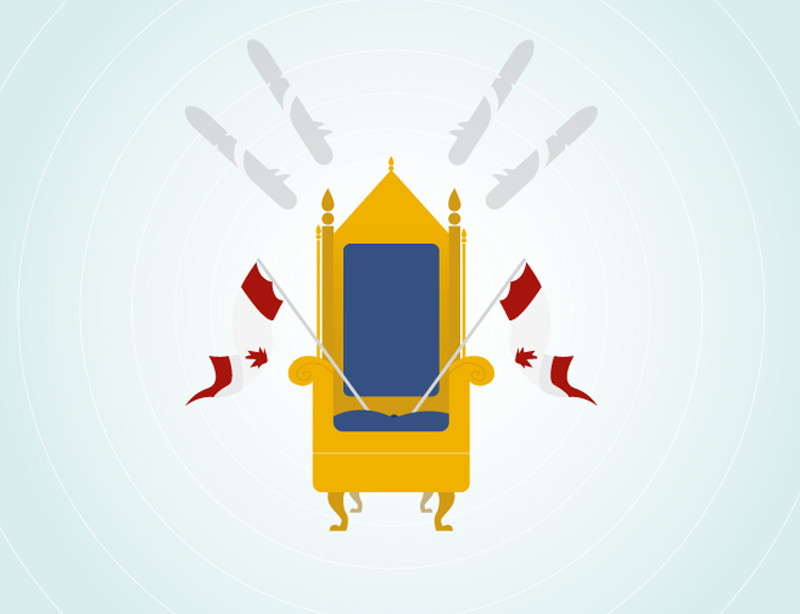Not my Canada
The right in this country is turning radical
Ian McKay, a history professor at Queen’s University, recently conducted a lecture entitled, “The Empire Strikes Back: Militarism, Imperial Nostalgia, and the Right-Wing Re-Conceptualization of Canada.” He argues that Canada is in the midst of “a radical right transformation” - and he may be correct.
Now, it’s probably essential to establish what exactly a “radical right transformation” entails.
It is not simply that a conservative government was voted in, because that is in no way radical; it is rather the type of conservative government that was voted in.
A government that embodies a “radical right transformation” is a regime whose policies and ideology promote: militarism; unfailing support in markets; dogmatic “realist” ideals; the erosion of functional and meaningful democracy; an exclusive monoculture; increasing income and social disparity; a reduction in rights and freedoms including the right to fair trial; and above all, the notion that security and stability of the state overrides all priorities, and that this security is gained only by the acquisition of more power.
The current Harper government, McKay correctly argues, may be such a government.
To clarify: neither myself nor McKay are arguing that all or any past conservative Canadian governments behave, or seek to behave, in this manner; on the contrary, this behaviour is a new, radical phenomenon in Canada.
The qualities of a radical right regime listed above, have unsettling similarities to those that are commonly found in authoritarian governments.
McKay makes the case that these are the policies we as Canadian citizens are beginning to endure. He argues we are shifting from a peacekeeping nation to a “warrior nation.”
McKay highlights recent government actions that exemplify this radical right regime.
These include the defamation of whistle-blower Richard Colvin and the Afghan torture issue in general, the behaviour of the police at the G20, the entire Omahr Kadhr case and the new tough on crime legislation.
To the above list I would also add the back to work legislation, which effectively decimates the power of unions, the inflation of the senate, the purchase of the F-18s, the attempt at abolishing the Wheat Board and the funding cuts to environmental and women’s organizations.
McKay argues what these policies and others essentially amount to is the emergence of “Caesarism,” defined as, “increasingly authoritarian politics, often centred on a particular leader, or a set of leaders, with a coherent strategy of demolishing the forces of democratic resistance, and also for encouraging people as seeing themselves as organically linked to the political organization.”
Caesarism for Canada would mean that parliament would increasingly appear to be a “sideshow” of the regime, and public opinion would be aggressively mobilized to reflect the regime’s wishes, with the goal of restructuring the current “social equilibrium.”
It’s worth noting that at this time, Canada does remain a country whose majority people are still committed to peacekeeping.
One of the consequences of inhibiting a Caesarist nation is the nation is defined by war.
This militarization of Canada becomes apparent not just in overt government policies such as the invasion of Libya and Afghanistan, but also in more subtle forms.
When one looks attentively at civil and political society they see an increasing number of army advertisements, aimed at recruiting soldiers. They see bumper stickers proclaiming support of the troops. They see the opponents to this warrior nation silenced and discredited.
And they see the simultaneous glorification and promotion of war, and the discrediting of peacekeeping as a romantic ideal in the media.
I do not like what I see.
This radical right transformation threatens the prevalence of Canadian democracy, and has already begun to degrade our nation’s reputation as a peacekeeping, co-operative nation.
Barry Cooper, a prominent advocate of such a transformation stated, “the new right’s overriding mission is to transform Canada from a nation of whiners, associated with authority undignified and a suffocatingly maternal political order, into a nation of virtuous warriors.”
Is this the Canada we want?
We find ourselves confronting a domestic threat to our culture and political order, and this threat must not go unquestioned, unreported or unopposed.
Luke Hildebrand is a second-year student studying politics and economics. He grew up in Kenora and Winkler, and moved to Winnipeg last year for university.
Published in Volume 66, Number 12 of The Uniter (November 17, 2011)








